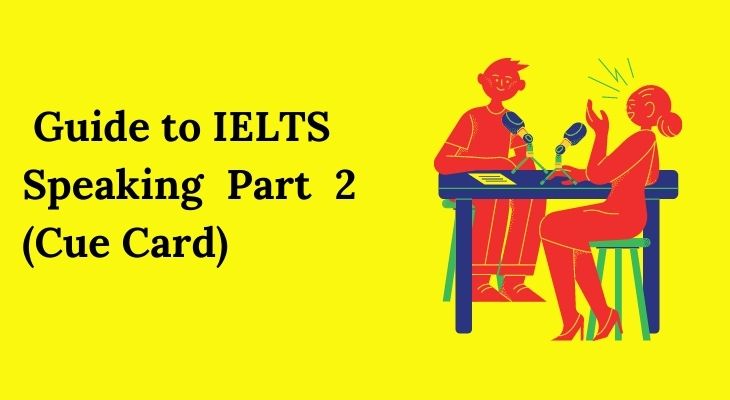Guide to IELTS Speaking Part 2: Cue Card
To help you get a band score of 7 or higher in IELTS Speaking, we’ve put together a Quick Guide. You can check out our last 2 posts here and here
Today, we’re going to look at the hardest part of the IELTS Speaking Test, Cue Card
About IELTS Speaking Part 2
In this part of the test, the examiner will give you a topic card which will contain a main topic followed by a few talking points. You will also be given a Pen and Paper for preparation.
You will have 1 minute to prepare and 1-2 minutes to talk.
The topic will involve something related to your life – for instance, you may be asked to narrate an experience, or to explain something that you like/dislike/know about.
Following your talk, the examiner will ask you 1-2 rounding off questions related to what you have said.
The entire part lasts for about 3-4 minutes.
How important is Part 2?
You need to do well in all 3 parts of the Speaking Test to get a good score. Cue Card is the most important part of the IELTS test. It carries about 50% of the IELTS speaking score and is therefore very important for a candidate.
However, this is the part where you will get to speak at length without interruption – which means that this is your best chance to show the examiner your English-speaking abilities. If you are unable to speak comfortably and at length, you will lose points.
Top tips for High Scores in IELTS Speaking Part 2
We’ve already given you a number of great tips for IELTS Speaking in our last two posts! Here are a few more that could come in handy for Part 2.
How do I decide what to speak about?
Usually, when you see the topic, the first idea that comes to your mind is the best thing to speak about. This thing is probably something you’ve thought about before, or has affected you very recently, or that you are interested in – that’s why it came to you so easily! Always pick a topic that has happened to you as it is much easier to speak about your experiences than concoct a story.
If this doesn’t happen, give yourself 10-15 seconds to scan through a couple of topics in your mind. However, you need to make the decision quickly, because it is more important to decide what you’re going to say.
What if I don’t know anything about the topic?
There is a chance that you may get a topic that you are unfamiliar with or do not know a lot about. But remember – this is a test of language, not knowledge.
During the preparation time, think about the simplest thing you could speak about that is related to the topic, and then find ways to connect it to your experience. You can give an example from your life, or give an opinion about it even if you don’t know any facts.
Do not try to think of a complicated answer, or try to recall a lot of facts about a topic, when you don’t really know any. You will waste time and you won’t be able to speak comfortably. Stick to what you know.



Comments
Post a Comment